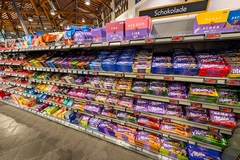
- Industry news
Industry news
- Category news
Category news
- Reports
- Key trends
- Multimedia
- Journal
- Events
- Suppliers
- Home
- Industry news
Industry news
- Category news
Category news
- Reports
- Key trends
- Multimedia
- Events
- Suppliers
UK Consumers Adapting to Tough Times, says Tesco UK CEO

Brasher highlighted current trends at the annual Retail Week Conference. He unveiled new Tesco customer research which illustrated how families are experiencing economic uncertainty very differently from one another.

3/17/2011 --- UK consumers are adapting to the pressures of economic change – from unemployment to higher taxes – in many ways which reveal their determined desire to keep hopes and dreams alive, accoridng to Tesco’s new UK CEO, Richard Brasher.
Brasher highlighted current trends at the annual Retail Week Conference – his first opportunity to speak to other retailers since moving into his role as head of Tesco’s business in the UK two weeks ago. He unveiled new Tesco customer research which illustrated how families are experiencing economic uncertainty very differently from one another.
He said: ‘We all know that the economy is having a big impact on consumer confidence – whether it’s unemployment, higher taxes, public spending cuts or higher fuel prices. But these trends are experienced by different families in very different ways. An affluent family might not notice a rise in food, VAT or utility prices. But to a lower income family these increases mean £12 less to spend each week. That is equivalent to an increase in income tax of almost five percentage points. A single act or event in the national economy becomes millions of individual experiences in people’s actual lives.’
By developing ways of listening to different families in more detail than ever before – spending time with them to talk about life in general – it is possible to understand some of these experiences. So it may not be surprising that everybody is affected to some extent by economic uncertainty: however, young people in particular are worrying about missing out on future job opportunities if they compromise and accept a lesser position than they had hoped for. And though becoming a parent is a joy, many also worry about how they can afford their new family.
Hope, however, remains – and UK consumers are adapting in interesting ways. ‘Families are often pleasantly surprised that being more resourceful can be enjoyable,’ explains Richard Brasher. ‘They have learned to budget better, to cook from scratch, to do DIY.’
He added: ‘People are also focusing more on their families and their homes – and many are rediscovering the richness of family life. Despite all the doom and gloom, most families aren’t unhappy. They haven’t given up on their dreams. Going to college, having a great holiday, getting a home, getting married, having kids, building up a nest egg – all these dreams live on in tough times.’
This adaptability has produced a new trend – the emergence of the determined and informed consumer, knowing there is always a good deal out there – the trick is simply to find it.
‘This doesn’t mean that we are in a vicious cycle of prices being battered down and down. Value for money trumps being the cheapest. Value for money can mean food that is fresh or made for one – because that means less waste. It can mean doing more home-cooking with quality ingredients.’
Tesco has responded by investing in lowering prices - £200m on more than 1,000 lines – and by launching 2,100 new and improved products. It has introduced new partners – such as London Aquarium and Disneyland Paris, to Clubcard Rewards.
And to respond to the still-strong consumer expectation that business will do more to protect the environment and communities, Tesco continues to cut CO2 in its business, to invest in community champions and to support programmes such as Race for Life.
Richard Brasher concluded: ‘Times are tough – but customers are determined to get through to the other side. We’ve got to help them. This is what going the extra mile for customers is all about. But we must also understand that their ambitions have not disappeared. They just need more help in realising them.’









